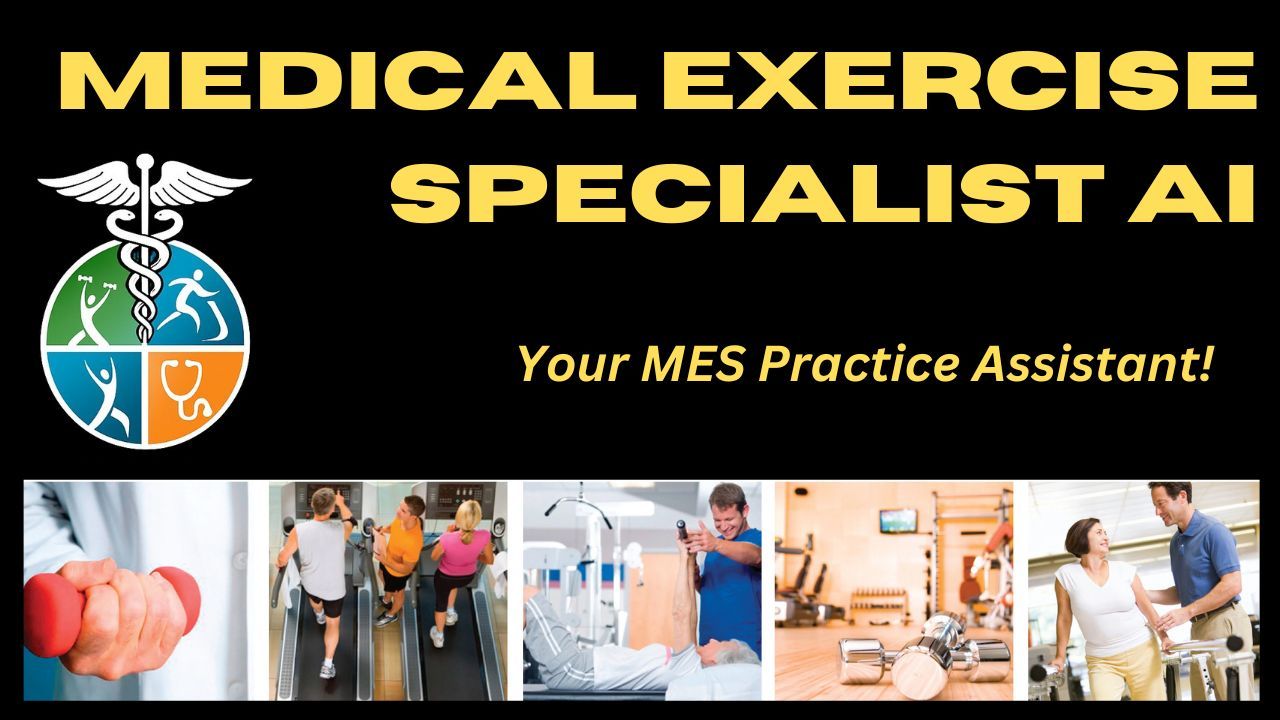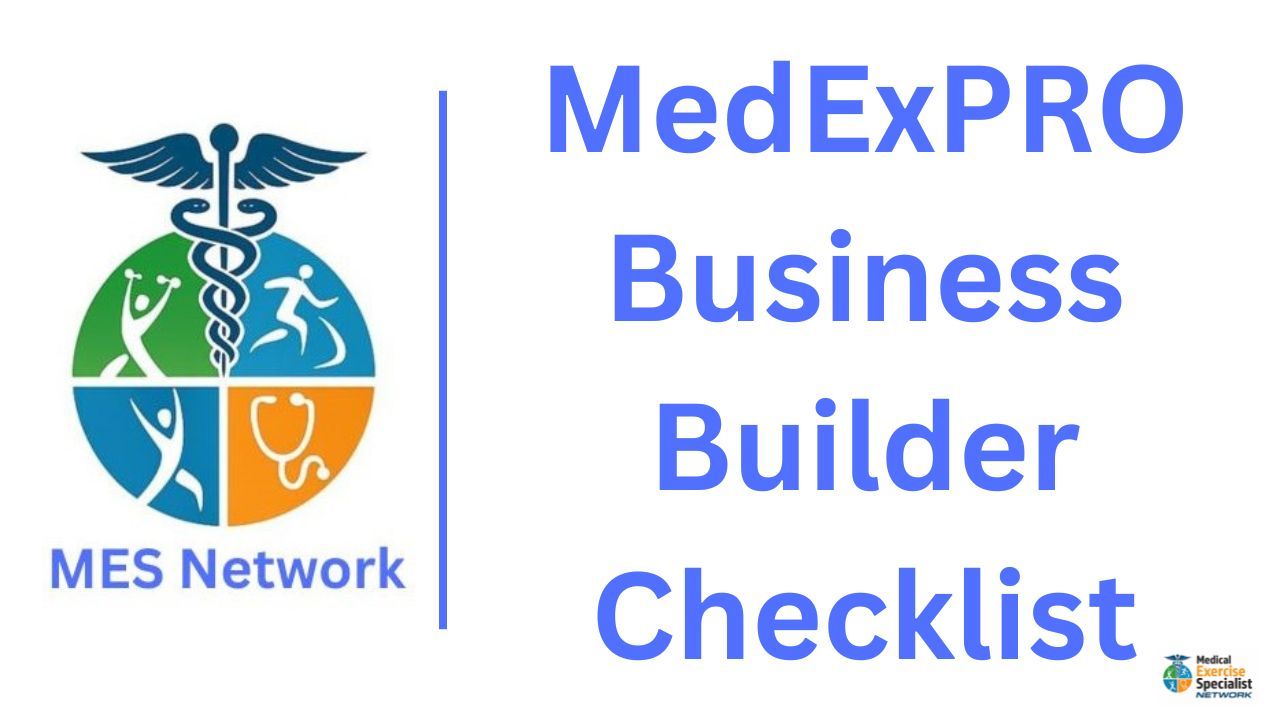5 MES AI Prompts Every MedExPRO Needs to Build a Referral-Ready Practice in 90 Days

Every MedExPRO Needs an AI Practice Assistant—Not Another Certification
Medical Exercise Training is not about workouts.
It is about systems, standards, communication, and outcomes.
And yet, most Medical Exercise Professionals are still trying to operate like healthcare-adjacent professionals without healthcare-adjacent infrastructure.
That’s not a motivation problem.
That’s a systems problem.
Most MedExPROs don’t struggle because they lack exercise knowledge. They struggle because they are expected to:
- Think like a professional
- Document like a professional
- Communicate like a professional
- Market like a professional
- And manage risk like a professional
…all while working alone, without structured guidance.
That gap is exactly why MES AI exists .
MES AI Is Not “ChatGPT for Fitness”
Let’s be clear.
MES AI is not:
- A workout generator
- A diagnostic tool
- A treatment engine
- Or a generic AI chatbot
MES AI is a scope-safe AI Practice Assistant, built on more than 30 ye...
MET 101 eBook Tip 46 - Expensive Equipment Won’t Make You Good
Equipping Your Medical Exercise Practice: Functionality Over Flash
One of the most common—and most misunderstood—questions Medical Exercise Professionals ask is:
“What equipment do I need to offer medical exercise services?”
The better question is this:
“What equipment supports safe progression, risk management, and functional outcomes for medically referred clients?”
In Tip 46 of the MET 101 series, the message is clear:
Your practice is not defined by high-tech equipment—it is defined by your clinical reasoning and how you apply exercise to medical conditions.
The most important “tools” in your facility are not machines. They are:
- Your understanding of clinical anatomy
- Your working knowledge of pathology
- Your ability to apply exercise within medical boundaries
- Your skill in communicating with referring providers
Equipment supports those skills—it does not replace them.
🧠 Before Equipment, Your Practice Must Have These Foundations
Regardless of facility size, every pr...
Your 2026 Medical Exercise Practice Success Begins TODAY!!
Your Medical Exercise Practice in 2026 Will Not Improve by Accident
It Improves When You Install the Right Systems
Hello MedExPRO,
As this year closes, I want you to pause—not to dwell on what didn’t happen in 2025—but to make a deliberate decision about what will happen in 2026.
Because here’s the truth most Medical Exercise Professionals quietly carry:
You know how to train.
You care deeply about your clients.
You show up consistently.
Yet you still:
- hesitate before documenting
- second-guess what to say to physicians
- avoid outreach because you’re unsure how you’ll be received
- feel pressure every time income slows
- wonder if you’re “missing something” other professionals seem to have
That doesn’t mean you lack ability.
It means you’ve been operating without a complete professional system.
And in 2026, that gap matters more than ever.
Medical Exercise Opportunities Are Real — But Only for Prepared Professionals
Medical Exercise Training opportunities are expanding:
-
...
MedExPROs Keep The Revenue Flowing During the Holidays

Holiday Revenue Strategy: The MedExPRO Quick Cash Flow 7-Day Checklist
The Christmas and year-end holidays often lead to paused schedules, cancelled sessions, and delayed client rescheduling. That slowdown is normal—but it doesn’t have to mean stalled revenue.
The MedExPRO Quick Cash Flow 7-Day Checklist was designed as a strategic revenue bridge—a focused, professional way to generate income and momentum during periods when regular training sessions temporarily slow.
Rather than relying on ongoing weekly sessions, this checklist helps MedExPROs:
-
create short-term revenue opportunities that don’t depend on full client schedules
-
engage post-discharge clients and community groups who remain active during the holidays
-
strengthen referral credibility so January begins with momentum—not a cold start
In just seven structured days, the checklist outlines how to:
-
onboard new clients through post-discharge and community-based services
-
demonstrate professional do
...
The Bedrock of Medical Exercise Training: Home-Based Services - MET 101 Tip #45
In Tip 45 of the MET 101 eBook series, Dr. Mike highlights the profound importance—and growing practicality—of offering home-based Medical Exercise Training (MET) services. Home-based care is already one of the most frequently utilized service models by medical exercise professionals, and demand is expected to increase dramatically over the next 20 years as the population ages.
Providing MET in the client’s home is not simply a convenience—it is arguably the most important component of medical exercise training.
This model plays a critical role in supporting the expanding senior population within the healthcare system by helping individuals maintain mobility, independence, and the ability to safely leave their homes. Physicians frequently request these services for homebound patients, particularly those who have completed their limited allotment of post-operative or post-acute physical therapy visits but have not yet achieved functional independence.
Medical Exercise Professionals (...
Medical Exercise Specialist — Don’t Make These 3 Critical Mistakes
Every week, I talk with Medical Exercise Professionals who ask, “Dr. Mike, why am I not getting referrals? Why isn’t my practice growing?”
Nine times out of ten, the reason isn’t lack of skill or passion—it’s one of three critical mistakes that hold almost every MedExPRO back. These aren’t small errors. They’re practice killers.
If you recognize yourself in any of these, the good news is that they’re 100% fixable—once you adopt the mindset and systems of a true medical exercise professional.
⚠️ Mistake #1: Believing Your Certification Will Get You Referrals
Let’s be clear: medical providers don’t care about your certification.
They don’t care whether it’s from METI, ACE, NASM, or ACSM. They care about three things:
- Your ability to communicate professionally.
- Your ability to produce measurable outcomes.
- Your ability to safely manage their patient within your scope.
That’s it.
Your certification may prove you’ve studied—but it doesn’t prove you can think, document, and comm...
Marketing for MedExPROs: Clarity, Clients, and Communication
Why Most MedExPROs Struggle with Marketing
One of the most consistent problems I see among medical exercise professionals is the inability to market their practices effectively.
Marketing isn’t just posting on social media or creating a clever logo. It’s communicating what you do, why it matters, and how your services improve the client’s life.
Branding, on the other hand, is what your reputation stands for.
It’s not the logo—it’s what stands behind the logo that makes people trust you.
Unfortunately, many MedExPROs confuse motion with strategy. A few Facebook posts, a Canva logo, or a new business card won’t build a practice. Marketing is not about activity—it’s about clarity and connection.
Step 1: Start with Clarity
Before you spend a single dollar on marketing, you need to be absolutely clear about three things:
- Your skills – What you can do exceptionally well and for whom.
- Your resources – What tools, systems, and support you have to deliver consistent outcomes.
- Your vi...
MedExPROs Must Build Expertise and Referral Bridges for Total Joint Replacement Clients

As a Medical Exercise Specialist (MES), you are positioned at a pivotal junction in the care continuum. After surgical rehabilitation for a total joint replacement, many clients emerge medically cleared yet still functionally limited. This gap—between ‘therapy ended’ and ‘full functional return’—is your professional opportunity. The upcoming surge in joint replacement volume is only going to increase the demand for skilled MedExPROs who can manage these clients back to meaningful movement, independence, and quality of life.
The Scope and Scale of Total Joint Replacements
- Current data from the American Joint Replacement Registry (AJRR) show the registry has captured millions of hip and knee arthroplasty procedures in the U.S. to date.
- Estimates suggest that in 2020 there were approximately 5.7 million Americans living with a total knee replacement (TKR) and 2.9 million with a total hip replacement (THR).
- The annual incidence is large and rising. For example, one study estimated ...
Aligning Medical Exercise Training with CPT Coding: Building the Bridge Between Function, Documentation, and Reimbursement

For decades, Medical Exercise Training (MET) existed in the gray zone between therapy and fitness—important work, but often unrecognized by healthcare and insurers. That’s changing.
Insurance carriers are now open to reimbursing MET services—but only when documentation, CPT coding, and professional ethics align. This is where many MedExPROs fail: they want medical recognition but operate with fitness-level documentation.
CPT Codes: The Language of Legitimacy
CPT codes are the language of healthcare billing. For Medical Exercise Professionals, they don’t represent treatment—they represent structured, medically necessary exercise.
The core MET codes include:
- 97110 – Therapeutic Exercise: Progressive strength and mobility work
- 97112 – Neuromuscular Re-education: Balance, coordination, motor control
- 97530 – Therapeutic Activities: Functional movements that improve ADL performance
Each session must justify the use of these codes with measurable outcomes and a written referral. W...
MedExPRO - Stop Chasing Clients...Start Building a Referral Driven Practice

You’ve earned your credentials. You know how to assess, design, and progress exercise safely for clients with medical conditions. But let’s be honest — great sessions alone don’t build great businesses.
At this stage of your MedExPRO journey, you’re not just managing clients… you’re managing a practice. That requires a different skill set — one built around systems, communication, and predictable revenue.
This post recently appeared in the Business Tier of the MES Network — the place where you learn to run your practice like a business, not a hobby.
- The Shift in Mindset: From Sessions to Systems
Every successful MedExPRO eventually reaches the same turning point: “I’m good at what I do, but I’m tired of chasing clients.”
This tier teaches you how to make your business run on systems, not sweat.
Start with clarity:
- Who are your top three referral sources — or who should they be?
- What are your top three measurable business goals (monthly revenue, referrals, retention)?
- What ...
